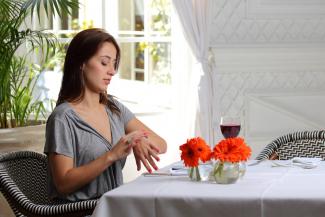
Look at these examples to see how just, yet, still and already are used.
I've just seen Sai. He's really enjoying his new job.
We haven't decided what to do yet.
I still haven't called Yumi to see how she is.
I've already had lunch but I'll join you for coffee.
Try this exercise to test your grammar.
- Grammar test 1
Read the explanation to learn more.
Grammar explanation
We often use just, yet, still and already with the present perfect because they are related to the present moment. This page focuses on the meaning and use of these words when they are used with the present perfect.
just
Just used with the present perfect means 'a short time before'.
I've just seen Susan coming out of the cinema.
Mike's just called. Can you ring him back, please?
Have you just taken my pen?!
Just comes between the auxiliary verb (have/has) and the past participle.
yet
Yet used with the present perfect means 'at any time up to now'. We use it to emphasise that we expect something to happen soon. Yet (in this context) is only used in negative sentences and questions.
Have you finished your homework yet?
I haven't finished it yet. I'll do it after dinner.
A. Where's Sam? B: He hasn't arrived yet.
Yet comes at the end of the sentence or question.
still
Still used with the present perfect means that something hasn't happened. We use it to emphasise that we expected the thing to happen earlier. Still (in this context) is only used in negative sentences.
I've been waiting for an hour and the bus still hasn't come.
They promised me that report yesterday but they still haven't finished it.
She still hasn't replied to my email. Maybe she's on holiday.
Still comes between the subject (the bus, they, etc.) and auxiliary verb (haven't/hasn't).
already
Already used with the present perfect means 'before now'. We use it to emphasise that something happened before something else or earlier than expected.
I've already spent my salary and it's two weeks before payday.
He wanted to see Sudden Risk but I've already seen it.
The train's left already!
Already can come between the auxiliary and the main verb or at the end of the clause.
Do this exercise to test your grammar again.
- Grammar test 2




Hello envint251,
I think this is purely a rhetorical device. It adds emphasis, as you say, and sounds very formal. It's much more common to put yet at the end of the clause.
Peter
The LearnEnglish Team
Hello Pradeep,
Neither is impossible grammatically, but perfect forms, whether present or past, need to refer to a time context and so which sentence is correct will depend on the context. Without any context we cannot say which sentence is appropriate.
If you can explain the context and what you want to say, we can suggest which version is better. Otherwise, all we can say is that both are grammatically possible.
Peter
The LearnEnglish Team
Hi Pradeep,
You don't need to use the past perfect here. I think the most likely options are these:
In the first sentence, the speaker thinks that Amit will not confirm it; he is no longer waiting for Amit's answer.
In the second sentence, the speaker thinks Amit will confirm it at some point and is waiting for him to do so.
Peter
The LearnEnglish Team
Hello Pradeep
That's correct -- well done!
All the best
Kirk
The LearnEnglish Team
Hello Lal,
Yes, you can use just with various tenses. Your example is correct.
Peter
The LearnEnglish Team